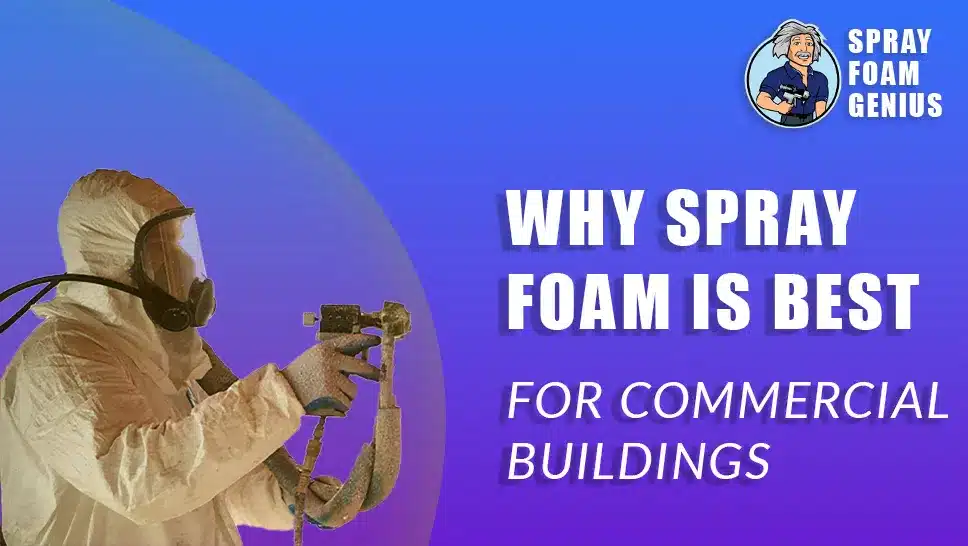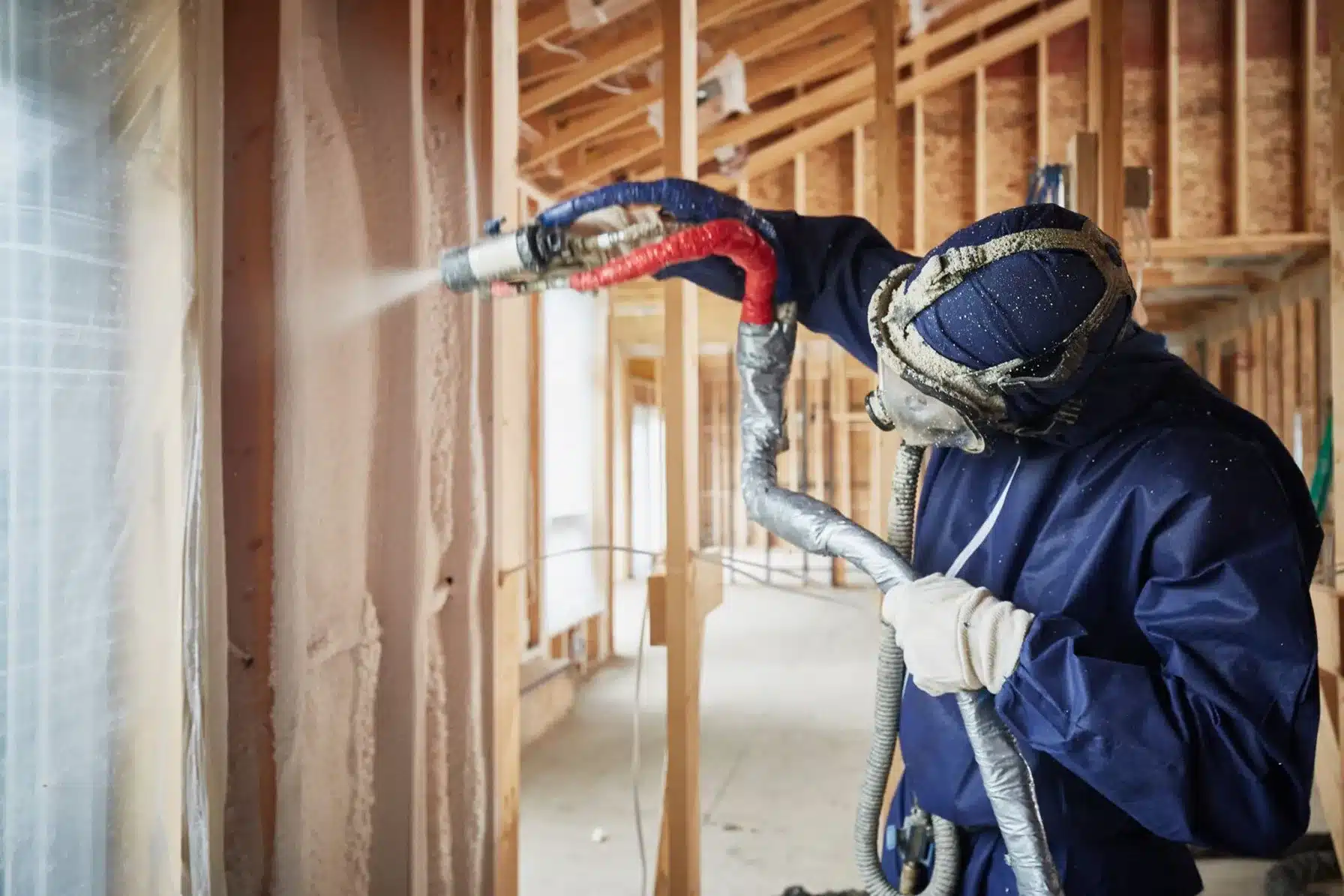
Spray foam insulation has become a top choice for many commercial building owners and contractors due to its numerous benefits that go beyond just keeping a building warm or cool. As businesses in the USA and Canada strive to enhance energy efficiency, reduce costs, and improve the comfort of their commercial spaces, spray foam insulation stands out as an ideal solution. In this comprehensive guide, we will explore the many advantages of spray foam insulation for commercial buildings, demonstrating why it is an investment that pays off in the long run.
What is Spray Foam Insulation?
Spray foam insulation is a versatile, high-performance insulation material that expands on application, creating an airtight seal in walls, roofs, and other surfaces. It is made from two main compounds, isocyanate and polyol resin, which are mixed on-site during application to form the foam. This insulation material is known for its superior insulation properties, high R-value, and ability to reduce air infiltration. Spray foam insulation is typically available in two types:
- Open-Cell Spray Foam: A lighter, less dense form of spray foam insulation that allows some air and moisture permeability, making it suitable for interior applications.
- Closed-Cell Spray Foam: A denser, more robust form of insulation that offers a higher R-value per inch and acts as both an air and moisture barrier, making it ideal for exterior applications and environments requiring high levels of insulation.
Energy Efficiency and Cost Savings
One of the most significant benefits of spray foam insulation for commercial buildings is its ability to dramatically improve energy efficiency. Here’s how:
1. Superior Insulation Value (High R-Value)
Spray foam insulation offers a much higher R-value per inch compared to traditional insulation materials like fiberglass or cellulose. The R-value measures the insulation’s resistance to heat flow, meaning the higher the R-value, the better the insulation. Closed-cell spray foam, for example, boasts an impressive R-value of about 6.5 per inch, which is significantly higher than other types of insulation.
2. Air Sealing Capabilities
Spray foam insulation creates an airtight seal that prevents air leaks, one of the main causes of energy loss in commercial buildings. Traditional insulation types may leave gaps or sag over time, but spray foam fills every nook and cranny, ensuring that conditioned air stays inside and unconditioned air remains outside. This air-sealing capability can reduce energy bills by up to 50%.
3. Reduced Heating and Cooling Costs
By maintaining a consistent indoor temperature, spray foam insulation reduces the workload on HVAC systems. This not only lowers energy bills but also prolongs the lifespan of heating and cooling equipment, leading to additional cost savings over time. Businesses can see a return on investment in spray foam insulation through reduced utility costs, often within just a few years of installation.
4. Enhanced Moisture Barrier
Moisture can be a significant issue for commercial buildings, leading to mold growth, structural damage, and increased energy consumption. Closed-cell spray foam acts as a moisture barrier, preventing water intrusion and reducing the risk of mold and mildew, which can degrade indoor air quality and require costly remediation.
Improved Indoor Air Quality
Indoor air quality is a crucial factor in maintaining a healthy and comfortable work environment. Spray foam insulation contributes to improved indoor air quality in several ways:
1. Reduction in Pollutants and Allergens
The airtight seal created by spray foam insulation minimizes the infiltration of outdoor pollutants, dust, and allergens. This is particularly beneficial in commercial buildings where maintaining a clean and healthy environment is essential for employee productivity and customer satisfaction.
2. Mold and Mildew Prevention
Because spray foam insulation is resistant to moisture, it helps prevent the conditions that allow mold and mildew to thrive. Mold growth can lead to serious health issues and expensive cleanup costs, so preventing it from the outset with spray foam insulation can save time, money, and health-related concerns.
3. Elimination of Air Gaps and Cold Spots
Air gaps and cold spots are common issues in poorly insulated buildings, leading to drafts and inconsistent temperatures. Spray foam insulation eliminates these gaps, resulting in a more comfortable and stable indoor environment.
Enhanced Structural Integrity

Spray foam insulation doesn’t just insulate; it also adds structural strength to commercial buildings. This benefit can be particularly valuable in areas prone to extreme weather conditions.
1. Increased Wall and Roof Strength
Closed-cell spray foam adds rigidity to walls and roofs by adhering directly to the surface, acting as an additional layer of protection. This added strength can help buildings withstand high winds and other environmental stresses, making them more resilient.
2. Protection Against Pests
Spray foam insulation can also act as a barrier against pests such as rodents and insects. Traditional insulation types, like fiberglass, can provide nesting sites for pests, but the solid, impermeable nature of spray foam denies pests entry points and nesting opportunities.
Sustainability and Environmental Benefits
As businesses increasingly prioritize sustainability, spray foam insulation stands out as an eco-friendly option due to its long-term environmental benefits.
1. Energy Conservation
By reducing energy consumption, spray foam insulation directly contributes to lower greenhouse gas emissions. For businesses committed to reducing their carbon footprint, this is a significant advantage.
2. Durability and Longevity
Spray foam insulation is incredibly durable, often lasting the lifetime of the building without needing replacement. This longevity reduces the environmental impact associated with manufacturing, transporting, and disposing of replacement insulation materials.
3. Recycled Content and Low VOCs
Many spray foam products are made with recycled materials and have low levels of volatile organic compounds (VOCs), making them safer for indoor air quality and better for the environment.
Cost-Effectiveness Over Time
While the initial cost of spray foam insulation may be higher than other types of insulation, the long-term cost benefits make it a wise investment:
1. Return on Investment (ROI)
The energy savings achieved through spray foam insulation can often offset the initial investment within just a few years. When combined with the reduced maintenance costs and increased durability, the ROI on spray foam insulation can be substantial.
2. Incentives and Rebates
Many utility companies and government programs offer incentives and rebates for energy-efficient upgrades, including spray foam insulation. These incentives can help offset the initial costs and further enhance the return on investment.
3. Reduced Maintenance Costs
Buildings insulated with spray foam require less maintenance compared to those with traditional insulation. The foam’s durability means it won’t sag or degrade over time, reducing the need for costly repairs or replacements.
Compliance with Building Codes and Standards
Spray foam insulation helps commercial buildings comply with local building codes and standards related to energy efficiency and fire safety:
1. Meeting Energy Efficiency Standards
Spray foam insulation can help commercial buildings meet or exceed energy efficiency standards set by local, state, or federal regulations. This compliance can lead to additional benefits, such as lower insurance premiums and increased property values.
2. Fire Safety Compliance
Many spray foam products are designed with fire retardant properties, helping buildings meet stringent fire safety codes. This added safety feature is essential in commercial buildings where protecting lives and property is a top priority.
How to Choose the Right Spray Foam Insulation Contractor
To maximize the benefits of spray foam insulation, it’s crucial to work with a qualified and experienced contractor. Here are some tips for choosing the right spray foam insulation contractor:
1. Check Credentials and Experience
Ensure the contractor has the necessary certifications and experience in installing spray foam insulation for commercial buildings. Look for contractors who specialize in spray foam insulation, as they will be more familiar with the unique requirements and best practices for commercial applications.
2. Request References and Reviews
Ask for references from previous clients and check online reviews to gauge the contractor’s reputation. A reliable contractor should have a track record of satisfied customers and successful projects.
3. Ask About Warranty and Maintenance
Inquire about the warranty offered on the spray foam insulation and any maintenance services provided by the contractor. A reputable contractor will stand behind their work and offer support if issues arise after installation.
4. Get a Detailed Quote
Request a detailed quote that includes all costs associated with the project, including preparation, application, and cleanup. Compare quotes from multiple contractors to ensure you are getting a fair price for the services provided.
Take Action Now: Enhance Your Commercial Building with Spray Foam Insulation
Are you ready to experience the many benefits of spray foam insulation for your commercial building? From improved energy efficiency and indoor air quality to enhanced structural integrity and noise reduction, spray foam insulation is an investment that pays off in multiple ways.
At Spray Foam Genius Marketing, we specialize in helping spray foam insulation contractors connect with businesses like yours. Our professional SEO, Google My Business / Google Business Profile optimization, local SEO, website development, lead generation, social media marketing, and reputation management services are designed exclusively for spray foam insulation contractors.
Call us at 877-840-FOAM for USA and 844-741-FOAM for Canada visit our website at sprayfoamgeniusmarketing.com, or email us at [email protected] to learn more about how we can help you achieve the best insulation results for your commercial building.
Don’t wait—start saving on energy costs and improving your building’s comfort and performance now!
- Social Media Marketing for Spray Foam Businesses: What Works in 2025? - February 6, 2025
- Best SEO Strategies for Spray Foam Insulation Contractors to Rank #1 on Google - February 6, 2025
- What is Spray Foam Insulation? Benefits and Applications - February 5, 2025

